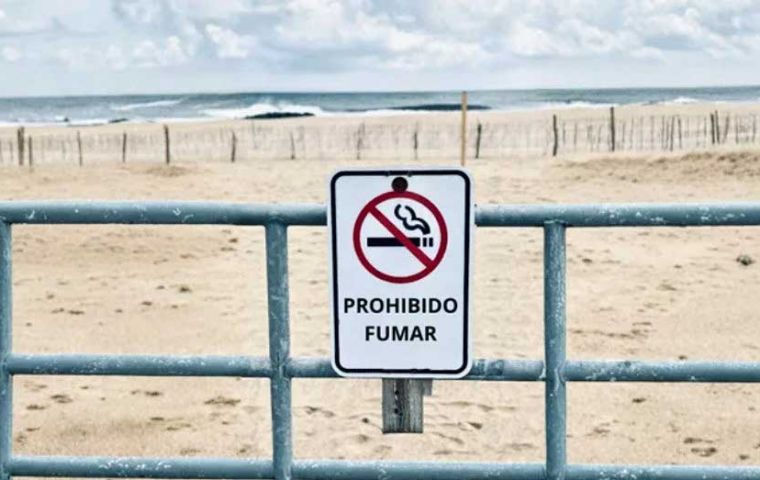MercoPress. South Atlantic News Agency
Argentina: Mar del Plata to fine beach smokers this summer
 Mar del Plata's move reflects a rapidly accelerating international trend to expand smoke-free policies
Mar del Plata's move reflects a rapidly accelerating international trend to expand smoke-free policies The Argentine city of Mar del Plata will fine people smoking on its beaches as of Dec. 1, ending a three-year implementation period based solely on voluntary compliance. The new rules will impose significant economic penalties on trespassers outside designated areas.
The measure, stemming from municipal legislation, requires all beach concessions to clearly signal smoke-free areas and install proper receptacles for cigarette butts, which are a major source of coastal pollution.
Under the new scheme, violators could face fines ranging from 0.15% to 1.5% of the equivalent of 100 municipal minimum salaries, which would be tantamount to between AR$50,899 and AR$508,992 (US$35.73 and US$357.31). The regulation applies to both public and private resorts. Smokers must extinguish their cigarettes before stepping onto the sand.
However, local authorities have not yet specified how the ban will be enforced. Mandatory signage indicating smoking and smoke-free zones has already been installed.
A central justification for the regulation is the severe environmental impact of tobacco waste. Studies by Argentina's National Council for Scientific and Technical Research (CONICET) found thousands of cigarette butts during surveys of Mar del Plata and Villa Gesell beaches. A single butt —made of cellulose acetate and over 90 chemicals— can pollute up to 1,000 liters of water and takes about 18 months to degrade in the sand.
The latest Provincial Coastal Marine Litter Census confirmed that butts are the most abundant plastic residue on all beaches in the province of Buenos Aires, accounting for nearly 20% of all waste found.
Mar del Plata views the measure as necessary for moving toward responsible use of public space, reducing coastal contamination, and protecting public health. This 2025/2026 season will serve as the first major test for the new strategy.
Other coastal towns, such as Villa Gesell, are piloting community and incentivized programs to combat cigarette butt contamination.
Both the Municipality and residents are celebrating private initiatives in this regard to boost environmental awareness and foster active participation.
Mar del Plata's move reflects a rapidly accelerating international trend to expand smoke-free policies beyond enclosed spaces into outdoor recreational and public areas to protect public health, reduce secondhand smoke exposure, and curb environmental pollution.
Effective July 1, 2025, France's regulations will prohibit smoking in all public spaces, including parks, beaches, forests, and areas around schools. This significantly broadens the country's existing ban on indoor smoking. Additionally, Chile explicitly prohibits smoking on all beaches, rivers, and lakes to protect natural recreational areas. Meanwhile, smoking bans on beaches are gaining momentum in Spain and Italy.
Other countries known for their strict policies are Singapore and the United Kingdom.




Top Comments
Disclaimer & comment rulesCommenting for this story is now closed.
If you have a Facebook account, become a fan and comment on our Facebook Page!